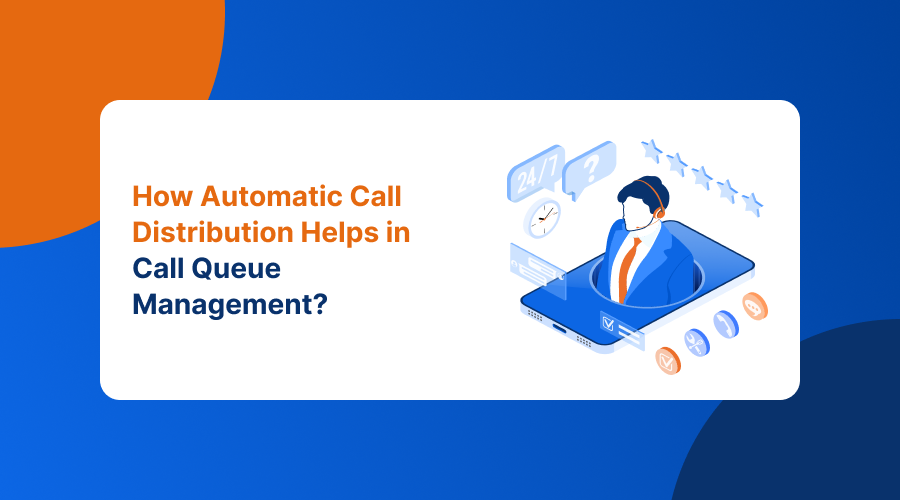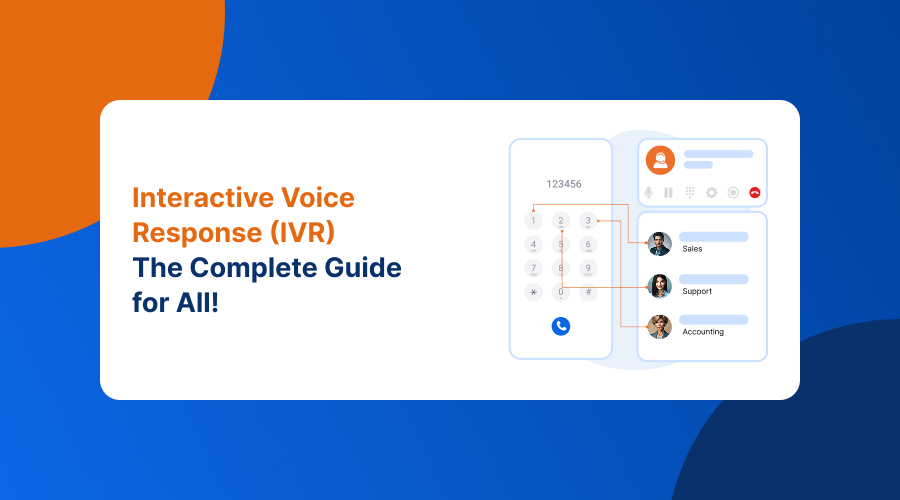In any business where customer calls play a major role, long waiting times and missed calls can cause frustration for both customers and support teams. According to facts 71% customers expect to reach someone right away when they contact the company. So, when users reach out, they expect instant attention, but in reality, agents can only handle one call at a time. That’s when call queue management becomes important.
Call queue management is a structured system that helps businesses dealing with multiple incoming calls effectively and stay in control, while ensuring no call opportunity is missed. At the center of this process is one primary technology, which is Automatic Call Distribution (ACD).
What Is Call Queue Management?
Now that you understand queue calling systems, let’s move a step further and know everything about the management of this call queue system.
Call queue management organizes, prioritizes, and tracks calls in a queue to minimize customer wait times and maximize agent efficiency. Specialized software, called a call queue management system or queue management software, typically manages this process.
This software not only tracks the number of calls in the queue but also provides insights such as wait time, call duration,and agent performance. A good call queue app can even display a call queue icon showing queue status in real-time.
In technical terms, a special software to create a job queue is called a queue management or routing system. These are specifically built to handle the large volumes of requests, just like call queue systems do for phone calls.
Simply, we can say that a call queue management ensures that no customer is left hanging, no agent is idle, and every call is handled professionally.
Why Is Call Queue Management Important?
For businesses, a missed or delayed call might be a missed opportunity. Without effective call center queue management, customers might have to wait, hang up, or lose faith in your service.
This is why spending money on a quality call queue management system is so important:
- Reduces Abandoned Calls: Customers can see their place in the queue and decide to wait or leave a callback number.
- Distributes Workload: Calls will be passed out evenly to the available agents.
- Improves Customer Experience: Shorter wait times and communication can instill trust.
- Improves Agent Productivity: Agents can focus on one client at a time instead of trying to juggle chaos.
- Provides Real Time Data: Supervisors can see data for calls in queue 0, calls in queue 1, or at peak hours; they can even have calls in queue 10.
A business that takes advantage of effective call queue management adds consistency and professionalism to each and every customer interaction.
Challenges in Managing Call Queues
Even the most advanced systems can face one or more of these problems:
- Volume of Calls: The sheer number of calls in peak times can fill queues quickly.
- Staff Shortage: In some cases, when you have incoming requests, you don’t have enough agents to address the requests.
- Customer Drop-Off: If routing or scheduling is poor, customers will abandon the queue.
- Limited Insights: Without proper analytics, handling a queue is challenging and won’t allow you to improve.
These persistent issues can be managed through vigilant monitoring of performance and your agents while committing to tools that make it easier to see and manage the queue.
How Automatic Call Distribution Supports Effective Call Queue Management?
One of the most significant innovations in the call queue management of today is the Automatic Call Distribution (ACD) system. It is the system that directs every incoming call to its respective extension or department, thus ensuring a quick connection of the customer with the right person or department.
ACD is not a simple system based on the principle of first-come, first-served but rather one that applies intelligent rules for effective call management. It creates an equilibrium for the different agents, reduces the waiting time, and allows the contact centers to give more personalized and quicker support.

The following are the features of automatic distribution that enhance the process:
1. More Intelligent Call Routing
ACD systems apply intelligent reasoning to allocate calls according to the criteria such as an agent’s availability, skill level, caller’s history, or even the time of the day. This means that every caller will receive the most appropriate agent, thus facilitating first-call resolution and reducing transfers.
2. Less Time for Holding
ACD redirects and processes calls automatically and accurately, which helps to avoid unnecessary delays. Fortunately, customers do not have to wait too long, and as a result, they are less likely to disconnect, thus the company is able to maintain high customer satisfaction even in the busiest of times.
3. Even Work Distribution Among Agents
The ACD network spreads calls out fairly among the agents, thus ensuring that no agent has more than they can handle. This avoids over-exhausting agents, gradually maintaining high morale, and providing a steady quality of service throughout the day.
4. Easier Management of High Call Volumes
In peak hours, ACD can place a caller on hold with an estimated wait time or offer a callback option. Moreover, it can also transfer excess incoming calls to other agents, departments, or even off-site teams, thus keeping the whole operation running without any hitches even under high pressure.
5. Enhanced Customer Experience
The integration of ACD with the CRM system gives the agents quick access to the caller’s profile containing their interaction history, previous problems, and purchases, thereby enabling the agents to have a more friendly talk and solve the matter quickly, thus providing a smooth customer experience.
6. Real-Time Tracking and Insights
Supervisors have the ability to check the performance through real-time dashboards that show call numbers, waiting queue, and agent’s work. This monitoring provides the management with a clear view of the operation and the ability to reduce any delays, plan the staff accordingly, and make decisions based on the data to improve the service.
7. Scalable and Future-Ready
ACD systems based in the cloud allow businesses to easily increase their capacity according to the increase in the number of calls. They are not only requiring little installation but also being able to respond to the customers’ needs without investing heavily in infrastructure, hence, they have turned out to be future-ready.
Summing Up
Ultimately, Automatic call distribution is not simply queuing control but a revolution in the way of connection between companies and clients. ACD does this by intelligently directing each call, sharing the workloads of the agents uniformly, and providing the management with real-time performance statistics, thus keeping the contact center operating at its utmost efficiency.
Therefore, if you aim to facilitate communication and make every customer interaction significant, the installation of ACD-powered advanced call queue management is the most intelligent and progressive step you can take.
Frequently Asked Questions
How does a call queue function?
Any call made to a business contact center gets directed into the call queue. New calls put themselves at the end of the line and get answered based on a first-come, first-served first basis by the next available agent. That is how a basic call queue system works.
What is a callback for call queues?
When the queue callback is enabled, call-in queue users are offered an option to save their place in the queue and request a callback when an incoming agent calls them. Ringing callers typically request a queue callback if they do not want to wait on hold in a long call queue.
How is the call queue different from auto attendant?
The primary role of an Auto attendant is to route a caller to an appropriate person or department based on what the caller inputs into the provided menu choices. Callers can be routed to individuals within your organization. Whereas, in the call queue, the customers wait to be spoken with by the next available agent.
How does automatic call distribution assist its operations?
An ACD has complex algorithms that consider agent availability, skills, or caller preferences. ACD uses a variety of methods (including skills-based routing, round-robin distribution, and priority-based) that can meet both customer and business needs in the call-handling process.
How can Cloud Contact Center Solutions improve call queue management?
Cloud contact center solutions like DeepCall automate call routing, offer live queue analytics, and enable scalability for high-volume business environments.





